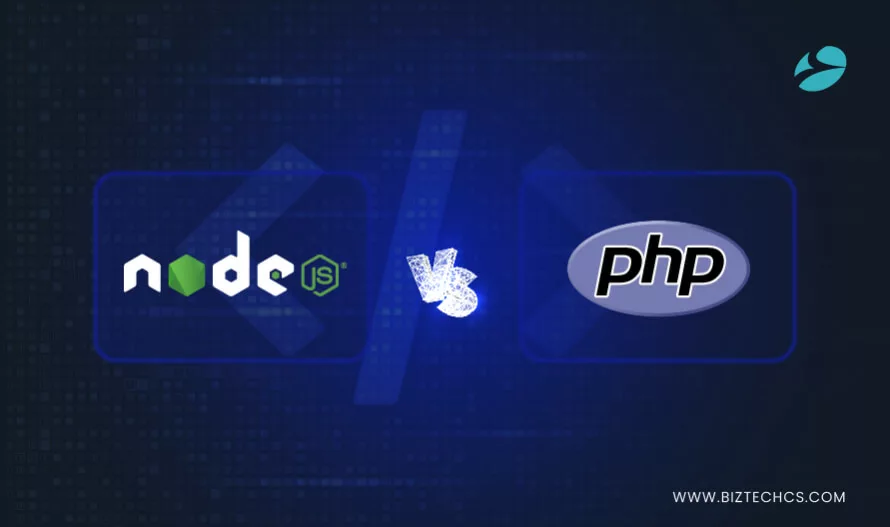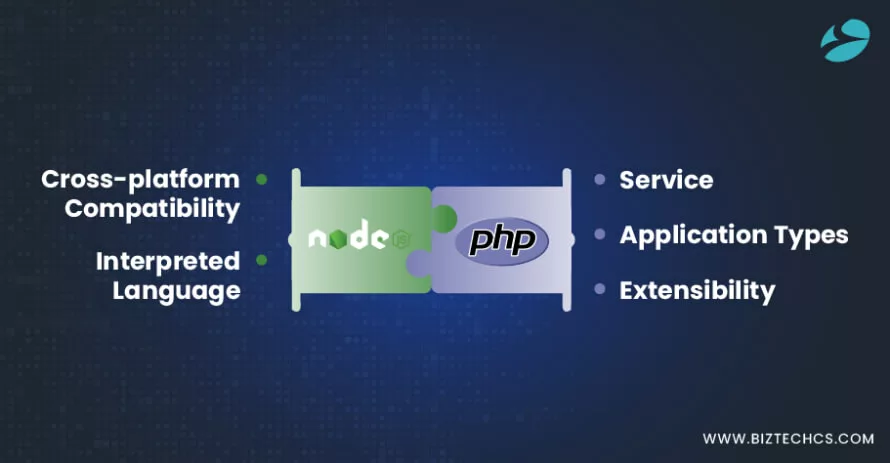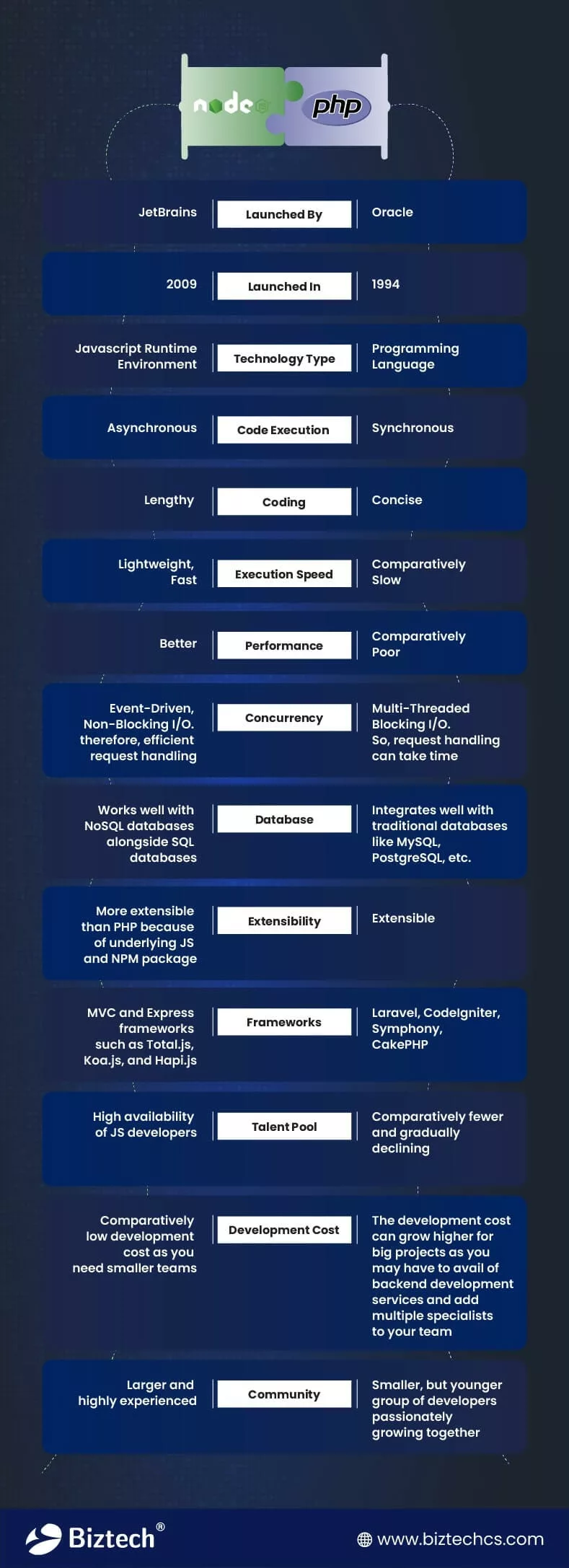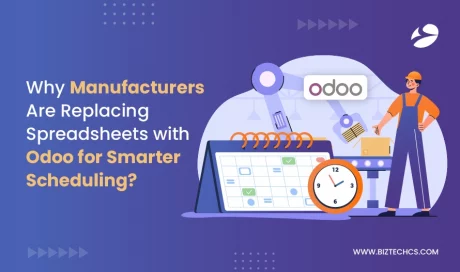2981
NodeJS Vs PHP: What Should Be Your Pick in 2024?
17 Jan, 2024
9 min read
2981
17 Jan, 2024
9 min read
Table of content

PHP is a general-purpose, open-source, server-side scripting language used to develop powerful web applications, websites, CRM systems, and more. Whereas, Nodejs is an open-source, cross-platform Javascript runtime environment that runs on V8 JS engine on multiple OS. It uses programming languages like Javascript, C, C++, Python, CoffeeScript, etc., used for traditional website development and backend API services.
As both NodeJS and PHP are known for their excellence in backend development, people often find themselves in a pickle finding it hard to choose the best of the two. Therefore, this guide on NodeJS Vs PHP is to help you compare the two technologies based on your project requirements, challenges, benefits, drawbacks, and more.
It should help you with your decision to hire Node JS developers or PHP developers as you would be more transparent about the choices you are making!
Now, let’s get started with the Node JS vs PHP comparison!
Since PHP is a programming language and NodeJS a Javascript runtime environment, you won’t really get many references for comparing their popularity. However, we can check their popularity in respective verticals.
A Statista 2023 report showed Node.js to be the most popular web framework preferred by 42.65% of developers. Another report by Statista showed PHP to be the 7th most popular programming language of 2023, preferred by about 18.97% of developers.
Compared to PHP, which was released in 1995, NodeJS is relatively new as it was first released in May 2009. Since then, NodeJS has transformed into a full-fledged web framework preferred by most developers.
Considering how PHP has been here for a long time and has received immense love from developers and entrepreneurs alike, it is still loved by many.
Moreover, it is important to understand the usability and specific features of each technology to compare and decide the best one for web app development.
Node.js is an open-source, cross-platform JavaScript runtime environment that allows developers to execute JavaScript code outside of a web browser. Traditionally, JavaScript was used for client-side scripting in web browsers. Node.js, however, enables JavaScript to be used for server-side scripting, and thus to produce dynamic web page content before the page is sent to the user’s web browser.
Its non-blocking, event-driven architecture, makes it efficient and suitable for scalable network applications. It uses the V8 JavaScript engine, the same engine used in Google Chrome, which compiles JavaScript directly to machine code for high performance.
Benefits of Node.js:
1. High Performance: Node.js utilizes the V8 JavaScript Engine which is extremely fast. Its non-blocking I/O model further enhances its performance, especially in handling concurrent requests.
2. Scalability: Designed with scalability in mind, Node.js works well in distributed environments and can handle a large number of simultaneous connections with high throughput.
3. Full-Stack JavaScript: Node.js allows developers to write both the client-side and server-side code in JavaScript, enabling a more uniform and integrated development process.
4. Strong Community and Ecosystem: Node.js has a large and active community, which contributes to a vast array of libraries and tools available through the npm (Node Package Manager).
5. Cross-Platform Development: Node.js supports cross-platform development, making it possible to build applications that run seamlessly on different operating systems.
Drawbacks of Node.js:
1. Performance Bottlenecks with CPU-Intensive Tasks: Node.js is not ideal for processing CPU-intensive tasks as its single-threaded nature can become a bottleneck.
2. Immature Tooling: While the ecosystem is vast, some tools in the Node.js environment are not as mature as those in other environments, which can lead to issues with stability and reliability.
P.S.: Callback Hell in NodeJS! The asynchronous nature of Node.js can lead to a phenomenon known as “callback hell” or “pyramid of doom”. It occurs when the written code becomes nested and difficult to read and maintain. However, this is not really a drawback as it can be avoided with better implementation and code maintenance.
Who Uses Node.js?
Node.js is used by a variety of companies, from startups to large enterprises, for its efficiency and scalability. Prominent users include Netflix, LinkedIn, PayPal, Uber, eBay, Walmart, and NASA.
Projects Best Suited for Node.js:
1. Real-Time Applications: Apps where real-time interaction is required such as chat applications, live streaming apps, and online gaming. Node.js is best suited for developing this kind of application because of its capability to handle concurrent requests efficiently.
2. Single Page Applications (SPAs): Node.js is well-suited for building fast and scalable SPAs, like social media platforms and e-commerce sites.
3. APIs for Web and Mobile Applications: Particularly RESTful APIs that interact with databases or external services.
4. Data Streaming Applications: Node.js can efficiently handle data streaming, which is beneficial for features like video streaming services. Reasons why streaming service giants like Netflix make use of Node.js architecture.
5. Microservices Architecture: Due to its lightweight nature and fast execution, Node.js is ideal for microservices architectures.
PHP (Hypertext Preprocessor) is an open-source, general-purpose scripting language that is well-suited for web development. It is a server-side scripting language, meaning that PHP code is executed on the server, and the client’s web browser receives the output as HTML.
Originally created in 1994 by Rasmus Lerdorf, PHP can be embedded in HTML, and it’s particularly adept at database integration. Today, we have multiple PHP frameworks available that make development easier for you.
Benefits of PHP:
1. Ease of Use: PHP has a simple syntax, which makes it relatively easy for newcomers to start programming with it.
2. Flexibility: PHP is a highly flexible language, compatible with various platforms (Linux, UNIX, Windows, macOS), and integrates well with other technologies like HTML, JavaScript, and CSS.
3. Strong Community Support: With a long history, PHP has a vast community and a wealth of documentation, frameworks, and resources available.
4. Cost-Effective: Being open-source, PHP is free to use, which reduces the cost of web development.
5. Efficiency in Performance: PHP is suitable for web development projects and can be optimized for speed and efficiency.
Drawbacks of PHP:
1. Security: PHP is often criticized for security vulnerabilities, although this can often be mitigated with good programming practices. By availing of PHP Development Services from a reputed company,
2. Not Suitable for Large Applications: While PHP can handle large applications, it may not be as efficient compared to other languages for very large or complex systems.
3. Inconsistencies: PHP has some inconsistencies in its function naming and conventions, which can be confusing for developers.
4. Performance Issues: PHP can have performance issues, especially in comparison to newer server-side languages and technologies.
Who Uses PHP?
PHP is used by small businesses to large corporations. It powers major content management systems (CMS) like WordPress, Drupal, and Joomla, and is used by websites such as Facebook and Wikipedia.
Projects Best Suited for PHP:
1. Ecommerce Websites: PHP is used widely for building eCommerce websites because of its high scalability and capability to handle huge traffic. Moreover, PHP frameworks like Laravel, Drupal, WordPress, Joomla, Symphony, and CodeIgniter are excellent choices for developing eCommerce websites.
2. Web Content Management Systems: CMS like WordPress and Drupal are built on top of PHP and are a perfect solution for developing custom CMS because of their ease of handling database operations and generating dynamic page content.
3. API Development: PHP can be used to develop RESTful APIs for web and mobile applications, facilitating the creation of APIs that allow for easy data exchange and integration with other services or applications.
4. Custom Web App Development: PHP’s versatility makes it an excellent choice for developing custom web applications such as project management tools, CRM systems, and more.
5. Data-Driven Applications: PHP’s integration with SQL-based databases makes it a good choice for applications that need to handle and present large amounts of data in a structured format. For example, inventory systems, data management platforms, etc.

Let’s check these points of comparison, to begin with!
As both PHP and Node.js act as backend technologies, this question often arises whether NodeJS is the better choice for modern-day web development or is it PHP. Here’s a brief comparison table for you to check so you can decide for yourself.

The decision between Node.js and PHP for a web development project hinges on several critical factors, including the nature of the project, performance requirements, developer proficiency, and the specific use cases at hand.
Node.js stands out for its excellent performance in handling real-time, I/O-intensive applications, and its seamless integration with JavaScript, making it an ideal choice for full-stack developers familiar with JavaScript. Its non-blocking architecture ensures efficient handling of concurrent requests, which is crucial for applications such as chatbots, online gaming platforms, and collaborative tools.
On the other hand, PHP is renowned for its simplicity, wide-ranging compatibility with various databases, and comprehensive support for all kinds of web hosting environments. It is particularly well-suited for traditional web applications, content management systems, and e-commerce websites. PHP’s ease of learning makes it a go-to choice for beginners in web development.
Ultimately, both Node.js and PHP have their unique strengths and are capable of building powerful and efficient web applications. The choice should be based on the specific needs of the project, the technical environment, and the expertise of the development team.
In some cases, a combination of both technologies might even be the best approach, leveraging the strengths of each to create a more robust and versatile web application. You can also begin choosing NodeJS development companies and discuss with the team how you can leverage both technologies to their fullest potential.
If you are looking for one such web application development company that can help you build dynamic web applications, BiztechCS might just be the one you are looking for. With our quality NodeJS development services, you can build highly robust, scalable, and secure web applications as you desire.
Odoo
16
By Biztech Editor
01 Jul, 2025

ERP
23
By Biztech Editor
30 Jun, 2025

Odoo
39
By Biztech Editor
25 Jun, 2025